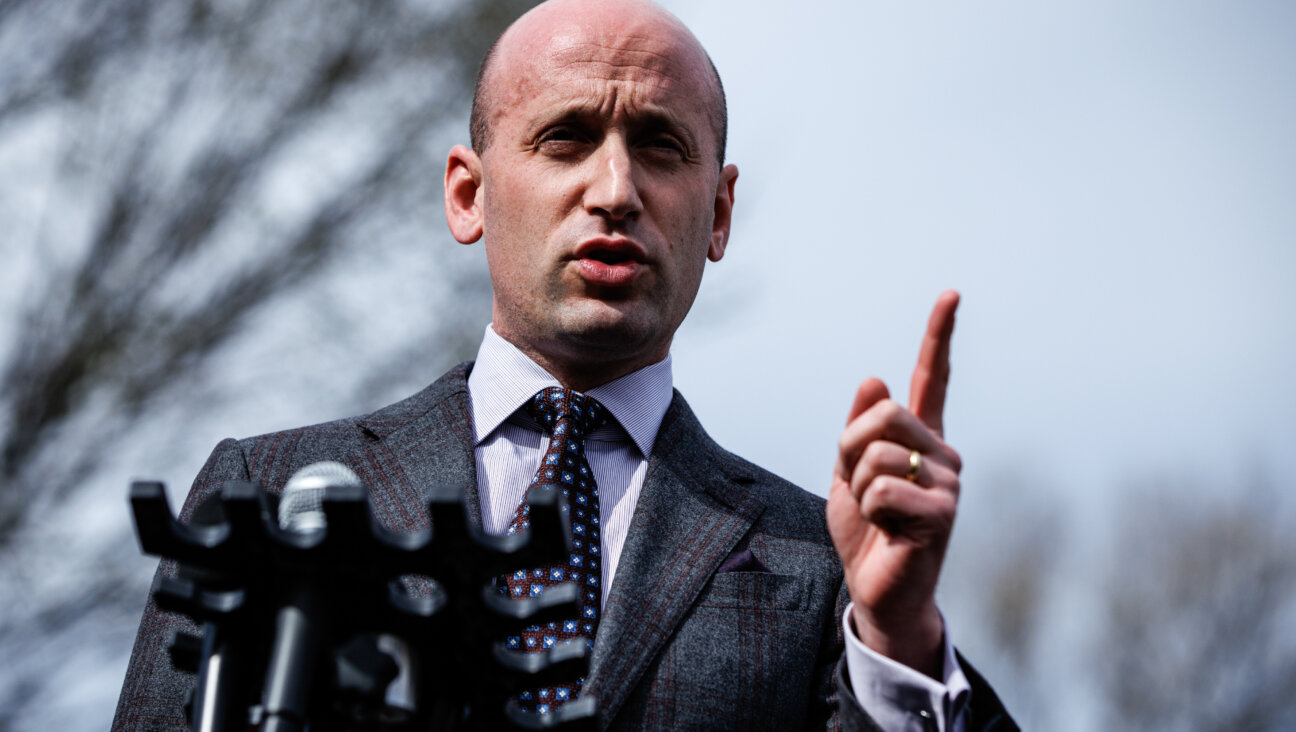Trembling Before Saying ‘God”
God.
There, I’ve said it. And I didn’t flinch.
That’s the big divide, according to Frank Luntz, a Republican strategist who first came to prominence when he helped draft Newt Gingrich’s late and unlamented “Contract With America” back in 1994. Now Luntz is freely dispensing advice to Democrats in search of “values.” Or, more properly, to Democrats who are persuaded that they had best start talking values talk if they want to appeal to Middle America. Reacting to the flurry of effort Democrats are investing in acquiring this allegedly new language, Luntz says: “They’ve learned the lessons of the battle, but not of the war. The battle is you have to be able to say ‘God’ and not flinch. They are picking up the language but not the emotion behind it.”
It is difficult to know, without further guidance, what “the emotion behind it” is supposed to be. Fear and trembling? Humility? Or contempt for all those (redundant) “godless atheists” — the ones that Gingrich, in his new book “Winning the Future,” dismisses as a tiny and extreme minority hopelessly out of touch with “traditional American values”?
There is, however, a very different kind of emotion that might be behind the invocation of God: Call it outrage, or indignation. After all, anyone who can (without flinching, of course) refer to “all God’s children” or to the idea that we are, all of us (and them, too) “created in the image of God,” must be profoundly offended by the current political situation in the United States. The president’s budget is, in the end, a moral document, a detailed statement of proposed priorities for the nation. Now, is it not offensive to propose the removal of 200,000 to 300,000 people from the food-stamp program — this at a time when food banks and soup kitchens are all reporting unprecedented demand for their services? Is it not offensive to cut home heating-oil assistance by 8%, this in a program that last year was able to help only one-sixth of the people who were eligible for such assistance? And so forth, on and on.
These things, and so very many others that are included in the budget President Bush has sent to Congress, are more than offensive; they are scandals. The word “scandal” comes to us from religious discourse; in its original meaning, it was not about the celebrity peccadilloes that are the stuff of The National Inquirer. It meant, specifically, an offense against God.
Comes the question: Do you have to believe in God in order to know that a proposal to cut Medicaid by $45 billion during the next 10 years is scandalous? Religious language offers a rich metaphoric system, and an appeal to the equality implied by the statement that we are all God’s children is an entirely legitimate appeal whether it comes from the lips of a believer in the Bible’s inerrancy or from the lips of an avowed secularist.
Does one have to believe in God in order to appreciate the implications of “and they are endowed by their Creator with certain inalienable rights?” Does citing such language violate the separation of church and state? Does it suggest, even for a moment, that a firm belief in God is a prerequisite for morality or for a belief in human rights? Hardly.
Still, Luntz is not entirely wrong: Some people on the left do in fact flinch when they say or even when they hear the word God; some are contemptuous of people of faith and dismissive of religious language. Such people have serious homework to do, as do those Democrats who are now eagerly looking for ways to paste the word “God” into the middle of a sentence. They are looking for the wrong thing; God-talk is not about interspersing your remarks with theological references or with biblical quotations. It is about a deep appreciation of the concerns and commitments upon which the religious traditions of our nation insist.
And an appreciation of our history, as well: The great movements for civil rights in this country — abolition of slavery in the 19th century and full equality of rights in the 20th — were led and sustained by devout people who were fluent in religious language and spoke that language eloquently. With that language, they aroused the conscience of the nation. True, others have spoken with equal eloquence and with equal passion on behalf of darker, more exclusionary causes. There are no monopolies here; we are a divided people.
But we are not divided, as Gingrich claims we are, between a narrow elite of “godless atheists” bent on secularizing the entire nation in its own image, and an embattled majority of devout citizens committed to “traditional values,” family oriented and god fearing. Those are not the fault lines. Our divisions cut a hundred different ways. And divided is not all we are; we are at the same time united, even though our unity is uncommonly frayed just now.
Remember the words of Abraham Lincoln: “We are not enemies, but friends. We must not be enemies. Though passion may have strained it must not break our bonds of affection. The mystic chords of memory, stretching from every battlefield and patriot grave to every living heart and hearthstone all over this broad land, will yet swell the chorus of the Union, when again touched, as surely they will be, by the better angels of our nature.”
Does one have to believe in angels to be moved by that statement, or to cite it?
Leonard Fein is the author of “Against the Dying of the Light: A Parent’s Story of Love, Loss, and Hope” (Jewish Lights).
The Forward is free to read, but it isn’t free to produce

I hope you appreciated this article. Before you go, I’d like to ask you to please support the Forward.
Now more than ever, American Jews need independent news they can trust, with reporting driven by truth, not ideology. We serve you, not any ideological agenda.
At a time when other newsrooms are closing or cutting back, the Forward has removed its paywall and invested additional resources to report on the ground from Israel and around the U.S. on the impact of the war, rising antisemitism and polarized discourse.
This is a great time to support independent Jewish journalism you rely on. Make a Passover gift today!
— Rachel Fishman Feddersen, Publisher and CEO
Most Popular
- 1

Opinion My Jewish moms group ousted me because I work for J Street. Is this what communal life has come to?
- 2

Opinion Trump’s Israel tariffs are a BDS dream come true — can Netanyahu make him rethink them?
- 3

Opinion I co-wrote Biden’s antisemitism strategy. Trump is making the threat worse
- 4

Film & TV How Marlene Dietrich saved me — or maybe my twin sister — and helped inspire me to become a lifelong activist
In Case You Missed It
-

Fast Forward ‘Next year in Gracie Mansion’: Where Jewish NYC mayoral candidates will do Seder
-

Fast Forward How Coke’s Passover recipe sparked an antisemitic conspiracy theory
-

Opinion Pro-Palestinian protests enriched Jewish life on my campus. Trump’s actions will do the opposite
-

Fast Forward Fake rabbi sentenced to 135 years for sexually abusing adoptive sons
-
Shop the Forward Store
100% of profits support our journalism
Republish This Story
Please read before republishing
We’re happy to make this story available to republish for free, unless it originated with JTA, Haaretz or another publication (as indicated on the article) and as long as you follow our guidelines.
You must comply with the following:
- Credit the Forward
- Retain our pixel
- Preserve our canonical link in Google search
- Add a noindex tag in Google search
See our full guidelines for more information, and this guide for detail about canonical URLs.
To republish, copy the HTML by clicking on the yellow button to the right; it includes our tracking pixel, all paragraph styles and hyperlinks, the author byline and credit to the Forward. It does not include images; to avoid copyright violations, you must add them manually, following our guidelines. Please email us at [email protected], subject line “republish,” with any questions or to let us know what stories you’re picking up.














